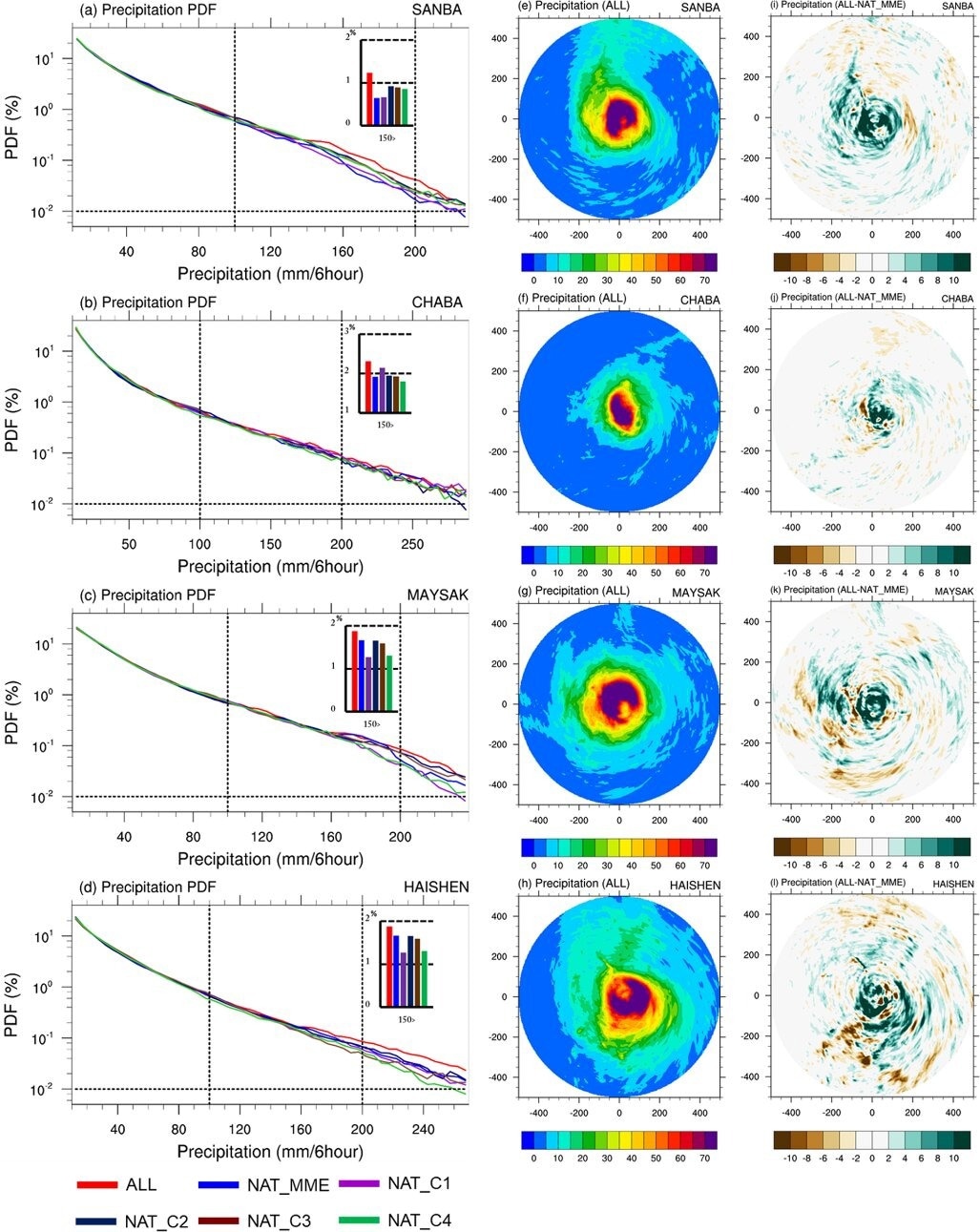With 36 fatalities last year, Typhoon Hinnamnor made headlines as the first super typhoon to form at a latitude as high as 25°N since records kept by the Korea Meteorological Administration were originally kept. This year, unexpected heavy rains in Osong, Chungcheongbuk-do, caused rivers to abruptly overflow, killing a number of people.
 Simulation outcomes from climate models for four potent typhoons (Sanba, Chaba, Maysak, and Haishen) that recently hit the Korean Peninsula under two conditions: current climate conditions including all anthropogenic and natural factors (ALL) and counterfactual conditions devoid of anthropogenic warming effects (NAT). Image Credit: POSTECH
Simulation outcomes from climate models for four potent typhoons (Sanba, Chaba, Maysak, and Haishen) that recently hit the Korean Peninsula under two conditions: current climate conditions including all anthropogenic and natural factors (ALL) and counterfactual conditions devoid of anthropogenic warming effects (NAT). Image Credit: POSTECH
The Earth's escalating temperatures are instigating unparalleled occurrences of typhoons, heavy rainfall, and various other extreme weather phenomena. It is still difficult to mitigate the harm caused by climate extremes that are not predicted with sufficient accuracy due to global warming.
Using a high-resolution climate model, Professor Seung-Ki Min and Dr Minkyu Lee of Pohang University of Science and Technology (POSTECH) have conducted a groundbreaking quantitative analysis of the effects of global warming on typhoons that make landfall on the Korean Peninsula. The study's findings were published in the journal npj Climate and Atmospheric Science.
Significantly, a rise in stronger typhoons that sustain their intensity for longer and thus inflict greater damage is being caused by global warming. Improved comprehension of the effects of global warming is necessary for accurate typhoon forecasting and damage minimization, and climate model simulations with a km-scale resolution are crucial for this.
There are still few studies that quantify the impact of human warming on typhoons that affect Korea, particularly those that focus on the extreme rainfall events that coincide with typhoons.
To get around this, the scientists created a 3-km high-resolution regional climate model simulation to look at how extreme precipitation and typhoon strength are affected by global warming. The Korean Peninsula was hit by four powerful typhoons between 2011 and 2020. These storms were selected for modeling under present climate circumstances and counterfactual settings without human-induced warming.
Diverse ocean warming trends assessed from CMIP6 various climate models were used by the researchers to lessen uncertainties in regional sea surface temperature changes caused by global warming. The results demonstrate that typhoon intensity and precipitation overall increased when global warming caused by human activity was taken into account.
The study team noticed that during maximum typhoon intensity compared to average intensity, the effects of warming were more noticeable. This suggests that strong super typhoons will likely occur over East Asia more frequently in the future.
Additionally, because of the warmer climate, the region vulnerable to typhoon-generated heavy rainfall increased by 16% to 37%. Furthermore, the intensification of upward motion close to the typhoon center and the rise in atmospheric water vapor as a result of ocean surface warming are blamed for the expansion of the excessive precipitation area.
Our results from high-resolution climate model simulations provide conclusive evidence that global warming has amplified the strength of recent typhoons making landfall on the Korean Peninsula. Continued escalation of global warming could lead to stronger typhoons and more extensive occurrences of rainfall extremes, demanding heightened sector-specific preparedness measures.
Minkyu Lee, Professor, Pohang University of Science and Technology
Journal Reference:
Lee, M., et.al., (2023). Convection-permitting simulations reveal expanded rainfall extremes of tropical cyclones affecting South Korea due to anthropogenic warming. npj Climate and Atmospheric Science. doi.org/10.1038/s41612-023-00509-w.
Source: https://international.postech.ac.kr/